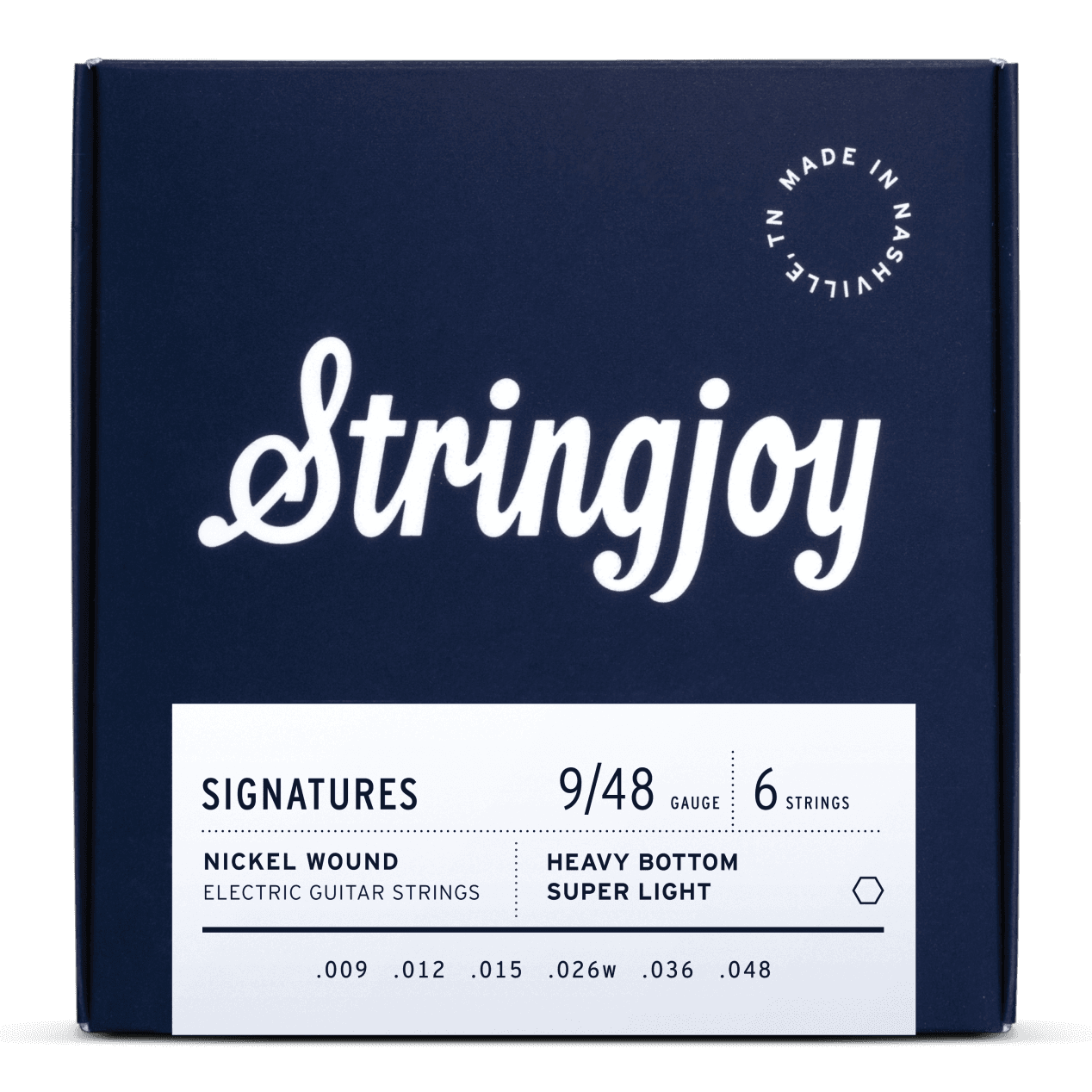Super Light Electric Guitar Strings: In Defense of 9s
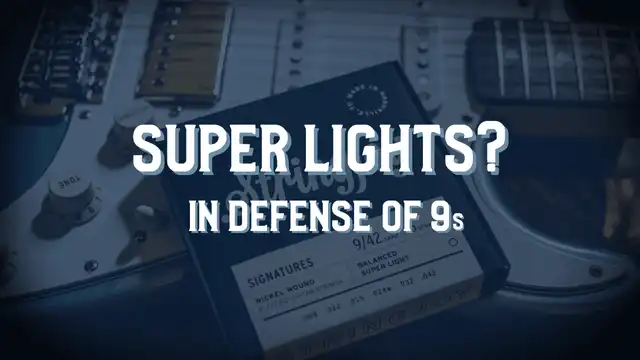

Super light guitar strings—also known as 9s—tend to generate Strong Internet Opinions™.
Somewhere along the line, a myth formed that only beginners or the physically frail would dare play them.
But 9s have a long, proud, unexpectedly historic lineage—and for many players, they’re an excellent choice. Let’s take a deep dive into where these featherweight strings came from, who’s used them, and when they can work wonders in your rig.
A Brief Origin Story: The (Strangely Ingenious) Birth of 9s
Back in the 1940s and ’50s, “light gauge electric strings” simply weren't a thing. Electric sets were basically acoustic sets made out of different metal—think 12s and 13s. Great for tone, less great for bending more than about a millimeter without snapping a tendon.
Guitarists wanted flexibility. So what did they do?
They hacked the system.
Players would grab a set of 12s or 11s, find a super-thin string—often a 9—from a banjo set, and slap it on as the new high E. Then they’d shift everything else down a spot: the old B became the new G, the old G became the new D, and so on.
This DIY approach is also why plain-third (unwound G string) sets became the norm. Players weren’t trying to reinvent the guitar—they were just MacGyver-ing their way to easier bends.

Famous Players Who Loved Their Light Strings
If you’ve ever believed that 9s are only for beginners, please allow a small, polite explosion of that myth.
Some absolutely legendary names have been known to rock super light sets:
- Eddie Van Halen
- Frank Zappa
- Randy Rhoads
- Angus Young
- Mark Knopfler
And that’s not even close to the whole list. Whether they were chasing extreme bends, expressive vibrato, or just felt the lighter gauge suited their playing, these icons proved that 9s are more than respectable—they’re downright classic.
The Big Benefits of Super Light Guitar Strings
1. Heroic Bending and Vibrato
This one’s obvious: lighter strings bend further and with less effort. If you dream of bending notes up a whole step or two (or five, if you're Jimmy Page, who sometimes used 8s), 9s are your friend.
But it’s not just the high strings—lighter wound strings let you add expressive vibrato to riffs in a way heavier sets simply don’t.
2. Extra “Fret Action” and Snap
If you play styles that thrive on the percussive sound of strings meeting frets—funk, for example—light strings can add more of that tactile zing. They’re responsive, lively, and full of character when you dig in.
Where 9s Can Fall Short
Of course, nothing is perfect—not even the humble 9.
1. Slightly Higher Breakage Risk
Thinner strings are, well… thinner. If your guitar is well-maintained, you shouldn’t be breaking strings constantly—but yes, super light strings can break more easily than their beefier cousins.
Still, considering how thin a 9 actually is, it’s amazing they hold up as long as they do. Tiny metal wire subjected to bending, sweat, weather, and enthusiastic picking? Frankly miraculous.
2. Clean Tones May Sound… Lighter
This is a subtle one, but it matters. When you’re running a heavy, distorted tone, string gauge has less tonal impact—your amp, pedals, and speakers are doing a lot of the lifting.
But in a clean-tone context (jazz, for instance), heavier strings offer a resonance and fullness that lighter gauges can’t quite match. If you live on sparkling, bell-like cleans, you might be happier with 10s, 11s, or even 12s.
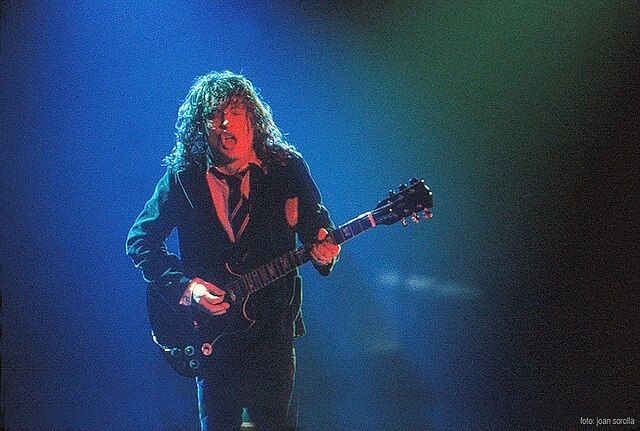
Should You Play 9s?
Ultimately, only you can answer that. But if you haven’t tried a super light set in years—or ever—it might be time to give them another shot.
Take this example: a hollow-body guitar equipped with a set of 9s can turn out to be unexpectedly inspiring. Maybe you plug it in, tweak the EQ to add back some low-end, and suddenly find yourself unlocking new riff ideas. Maybe the extra vibrato opens up phrasing possibilities you haven’t felt in years.
For many players, returning to light strings—or choosing something in-between, like 9.5s—turns out to be a creative recharge.
Super Light Love
Some of our favorite super light Stringjoy staples
Why Not All 9s Are Created Equal
Before grabbing the nearest pack of super light strings, there’s something important to know: Different brands build their 9s very differently.
The most common “traditional” set is:
9 – 11 – 16 – 24w – 32 – 42
But this gauge progression is a relic of the old “throw a banjo string on top of leftover acoustic gauges” method. It works, but it isn’t ideal.
Many modern builders (including us) prefer:
9 – 12 – 15 – 24w – 32 – 42
Here’s why those differences matter:
A Better-Balanced B String
Traditional sets use an 11, but that string is usually under-tensioned compared to its neighbors. A 12 provides better balance and smoother feel across the top strings.
A More Musically Even G String
A 15 is extremely close in tension to both the 9 and the 12—less than 0.2 pounds difference in some cases. A 16, on the other hand, is significantly stiffer, which makes the G string stand out in chords. Instead of blending, it jumps out—sometimes unpleasantly.
A set with 9-12-15 on top has a tighter, more even feel and tone.
It should be noted that here at Stringjoy, we have gone deep into expanding the Super Light universe to previously unexplored landscapes. For instance, our "Husky" and "Plus" sets in our standard lineup give you the option of mixing and matching super-light tops with regular-light bottoms or tweaking your 9s up just a hair to 9.5. And as always, a carefully curated Custom set can make your most obscure super light dreams come true.
Final Thoughts
Love them or mock them, 9s are here to stay. For some players, they can unlock expressive bends and effortless vibrato. For others, they’re a great match for funk or heavily driven tones. And honestly? They’ve earned far more respect than the memes give them.
Whether you’re a die-hard 10s player, a sworn enemy of light gauges, or someone who mixes and matches depending on the guitar, it’s worth experimenting. Sometimes the smallest change—literally—opens up a whole new world of creative inspiration.
Other Posts you may like

Guitar Strings Order: How the Guitar is Tuned and Why

Two Handed Tapping: Our Top 8 Tappers of All Time
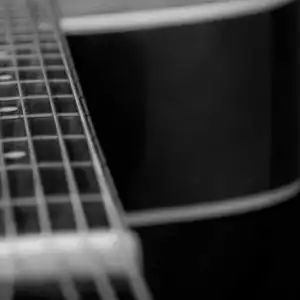
Which Guitar Strings Wear Your Fret Wire Down More?
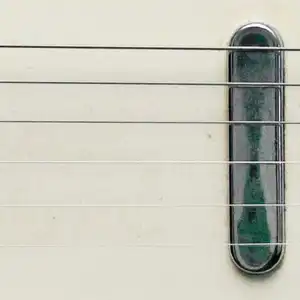
What is Nashville Tuning? Its History, Best Guitar Strings & Uses
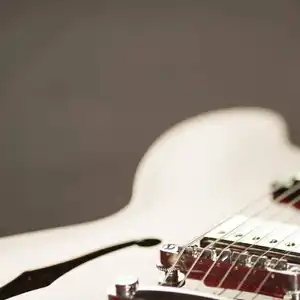
Guitar Scale Length Explained: String Tension & Playability
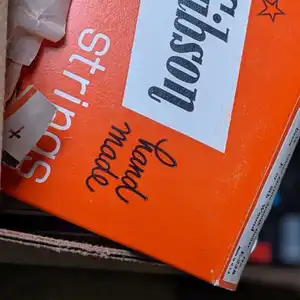
What Guitar Strings I Used To Play...
0 Responses
Leave a Reply
Your email address will not be published. Required fields are marked *
